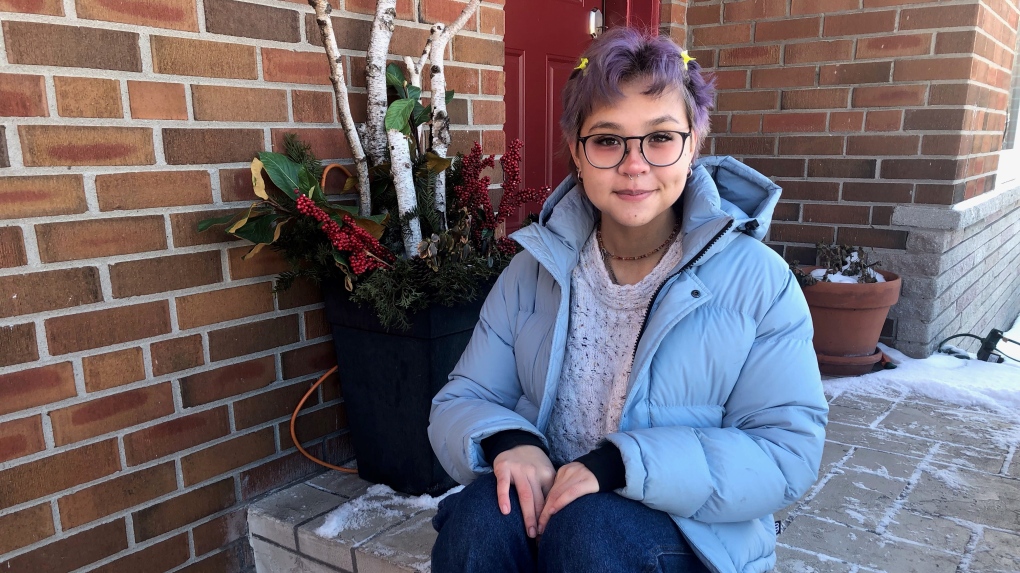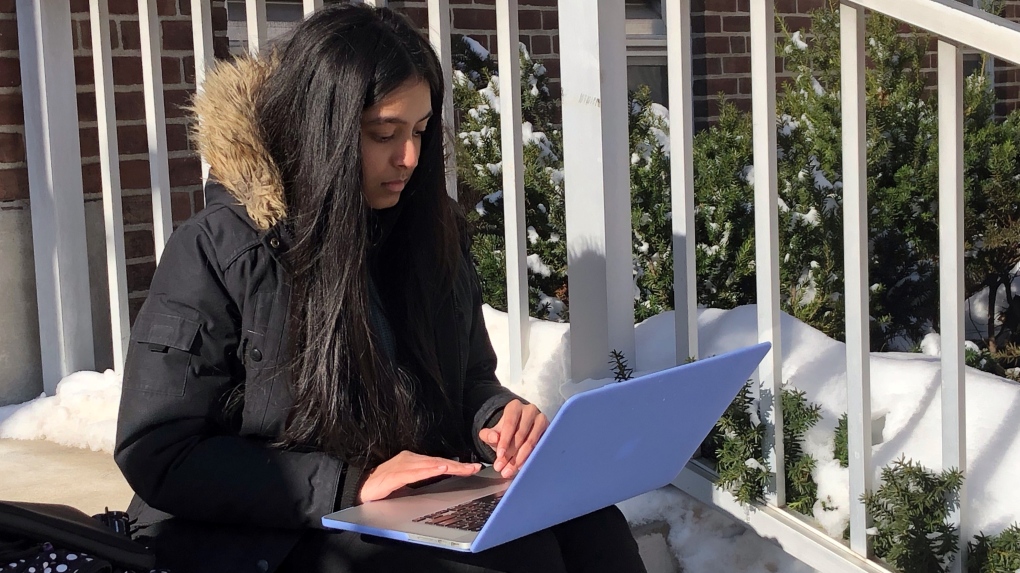'Definitely overwhelming': Pandemic isolation having profound impact on mental health of young people
As the COVID-19 pandemic approaches the two year mark, isolation continues to take a toll on the mental health of young people — although evidence also shows they are also finding ways to cope.
Mari de Jesus is a Grade 12 student at Senator O’Connor College School in North York. The 17-year-old experienced mental health challenges before the pandemic, but in March 2020, they worsened.
De Jesus attributes the change to the isolation and adjusting to the “new normal.”
“It was definitely overwhelming. I know for myself and so many other people, our kind of way of coping with mental issues was distracting yourself and going out and seeing people, but then suddenly I was at home all alone. Alone with all my thoughts,” they said.
De Jesus felt more anxiety and was spiralling, thinking one negative thought, which would turn into many more.
“It was hard to come out of this hole I dug myself into.”
One night de Jesus decided to go to the hospital.
“I didn’t feel safe at home by myself.”
De Jesus is doing better now, managing changes with the pandemic and has a goal to become a social worker.
 Mari de Jesus is seen in this photograph. (Beth Macdonell/CTV News Toronto)
Mari de Jesus is seen in this photograph. (Beth Macdonell/CTV News Toronto)
They said the biggest mental health help during the pandemic was getting online and talking through virtual settings with friends, along with regularly seeing a therapist and texting Kids Help Phone.
De Jesus also uses social media to connect with peers and help others, which helps them cope too.
“100 per cent. That is a big thing for me,” de Jesus said.
“I’m kind of known as the mental health guy, like though my peers. If anyone has a problem they just come to me, even if we are not the closest, just because I’m so open about it. I’m very much trying to stop that stigma around mental health and spark a conversation about it.”
Over time, de Jesus has also been developing coping skills, including learning how to sit with emotions and proceeding mindfully.
“Knowing I don’t feel good right now, but it won’t last forever.”
ISOLATION HAVING PROFOUND IMPACT ON YOUNG PEOPLE
Joanna Henderson is a clinical psychologist, and senior clinical scientist at the Centre for Addiction and Mental Health. She’s also the Executive Director of Youth Wellness Hubs Ontario serving youth from 12 to 25 years of age.
Since the third week of the pandemic, Henderson has helped survey youth in Ontario about their experiences over the past two years, including looking at mental health.
“Isolation has a profound impact on young people,” Henderson said.
Henderson said during adolescences social connections typically mark important shifts, like an expanding social circle, the development of romantic relationships, and the emergence of work social relationships. All of these connections become key to many aspects of functioning.
“With the pandemic this key aspect of adolescent and young adult functioning has been compromised. The public health restrictions, concerns about health, and it created a lot of challenges for many young people.”
Henderson said it means some the developmental paths in terms of social relationships are happening more slowly — and used the example of transitioning from secondary school to post-secondary school or into work to meet new people and build relationships.
Even young people’s ability to get their drivers’ licence is having an impact.
“To be able to have the autonomy to be connecting in the community — all of these things have been delayed for many young people.”
She said the isolation has been “a significant negative” and said youth have experienced increased levels of anxiety and depression, along with concerns about body image and eating behaviours.
Henderson said there are young people who had pre-existing mental health concerns that are now experiencing significant difficultly, and there are those who hadn’t experienced it before, but are now newly experiencing it.
TDSB WELL-BEING PROGRAM TACKLING ISOLATION
A program at the Toronto District School Board (TDSB) is tackling pandemic isolation among students.
Yousra Lakhani, is a peer leader with Students for Well-Being, nicknamed as ‘S4W’ and is a Grade 12 student at Leaside High School.
‘Students are able to come together and discuss initiatives relating to mental health, well-being, coping mechanisms,” Lakhani said.
 Yousra Lakhani is seen in this photograph. (Beth Macdonell/CTV News Toronto)
Yousra Lakhani is seen in this photograph. (Beth Macdonell/CTV News Toronto)
So far she said the events have mostly been virtual — Café Break, for example, is a drop-in about mental health and well-being, created fun games like Pictionary to help spur dialogue.
Lakhani said some of the topics discussed include body image and intersectionality.
“Even on Zoom it’s so nice to see they are so engaged, like talking in the chat and it’s really nice to see the interaction they have.”
Lakhani said one of the benefits of the group is that students are able to come up with the events, which helps keep students engaged.
“I think the pandemic has been really hard for students, especially the uncertainly of the pandemic, not knowing if school is going to open and refreshing Twitter to see what the latest updates are,” she said, adding the disconnect from friends and activities has also been challenging as these interactions are often used as a coping mechanism.
Lakhani said the goal of the meet-ups are to have real talks and so students can relate to one another, because what people are feeling is normal.
Imani Hennie, a social worker and the mental lead with the TSDB, focuses on mentoring and inspiring students in the group about positive mental and well-being, providing mental health literacy so the students can describe their feelings and reach out for help, and help one another.
“We know that students are tired of being home. The pandemic fatigue is there. We know they fear another total lockdown,” said Hennie.
Hennie said some students are also disproportionately impacted based on race - Black, Indigenous and people of colour.
“What we try to really encourage the students to look at what works for them. What is in their control in the moment, in the day. What can they do to make them feel good.”
MENTAL HEALTH DIFFICULTIES TIED TO CHANGES IN PUBLIC HEALTH RESTRICTIONS
Through research, Henderson and others found a majority of youth have experienced mental health difficulties to varying degrees — discovering it improved over the summer and declined as school resumed.
“Interestingly, though not surprising, we do see those difficulties at times for some young people correspond with changes in the public health restrictions,” Henderson said.
“We also interestingly found that there are some young people for whom some aspects of the public health restrictions have actually contributed to improved mental health for them. Some young people have talked about prior to the pandemic their lives were very full, very scheduled, very demanding.”
Henderson said these youth were able to step away from some activities and over time found that they may not return to the same level of busyness, while some found online learning to be a good fit.
Overall, she said, the research has shown there is one story for everyone.
“It’s quite individualized, depending on context and experience.”
ISOLATION AND FINDING WAYS TO BE OKAY
Henderson said the story of youth being isolated during the pandemic has also led to them finding ways to cope with mental health challenges.
“We seen a lot of creativity in terms of how youth are using digital technologies to stay connected,” said Henderson, citing the example of young people virtually watching movies together.
She said some youth are also spending more time outside and in nature.
Henderson said when it comes to “memory-making” experiences, such as graduation when family and friends come together, and the impact of missing these events have, it’s important to be cautious.
“Young people haven’t had those experiences yet. It can be the surrounding family and friends and media that keep sending the messages to young people that this is a terrible thing to have missed. Given they haven’t experienced it, I think we can do more in terms of supporting young people to recognize that there are exciting things ahead.”
She said while acknowledging some missed events are disappointing, it’s important to look forward.
Henderson said what she believes is most interesting is leading to significant changes against multiple domains of functioning of young people is in the school system, which ultimately may lead to more options for young people and may enhance their quality of life down the road.
STAY CONNECTED
Henderson advises youth experiencing mental health difficulties to stay connected to friends and reach out to people who can provide support.
Every day basics and routines are also important.
“Regular sleep routine, eating at regular points throughout the day, getting some exercise, reaching out and connecting with friends and family, these are critical for mental health,” she said.
Henderson said even though the pandemic is two years in, it’s important to keep at it and keep trying and to continue building on the positives.
CTVNews.ca Top Stories

Canada Disability Benefit needs to be safeguarded from clawbacks, MPs unanimously agree
The federal government needs to safeguard the incoming Canada Disability Benefit from clawbacks and do more to ensure it actually meets the stated aim of lifting people living with disabilities out of poverty, MPs from all parties agree.
Security guard shot, seriously injured outside of Drake's Toronto mansion
A security guard working at Drake’s Bridle Path mansion in Toronto was seriously injured in a shooting outside the residence early Tuesday morning, police said.
King Charles too busy to see son Prince Harry during U.K. trip
Prince Harry will not be seeing his father King Charles during his current visit to Britain as the monarch will be too busy, Harry's spokesperson said on Tuesday.
opinion Tom Mulcair: Turfing Poilievre from House a clear sign of desperation by Trudeau Liberals
When Speaker Greg Fergus tossed out Pierre Poilievre from the House last week, "those of us who have experience as parliamentarians simply couldn't believe our eyes," writes former NDP leader Tom Mulcair in his column for CTVNews.ca
Your body needs these three forms of movement every week
Movement is movement, right? Not exactly. Here’s what your body is looking for in addition to your morning walk or yoga session, according to experts.
Testifying in hush money trial, adult film actor Stormy Daniels describes first meeting Trump
Stormy Daniels took the witness stand Tuesday in the hush money trial of former U.S. president Donald Trump, prepared to testify about a sexual encounter the porn actor says she had in 2006 that resulted in her being paid off to keep silent during the presidential election 10 years later.
'It looked so legit': Ontario man pays $7,700 for luxury villa found on Booking.com, but the listing was fake
An Ontario man says he paid more than $7,700 for a luxury villa he found on a popular travel website -- but the listing was fake.
Boy Scouts of America changing name for first time in 114 years, aiming for inclusivity
The Boy Scouts of America is changing its name for the first time in its 114-year history and will become Scouting America. It's a significant shift as the organization emerges from bankruptcy following a flood of sexual abuse claims and seeks to focus on inclusion.
Canadian cadets rock mullets and place second at U.S. military competition
Sporting mullets, Canadian Armed Forces officer cadets placed second in an annual military skills competition in the U.S.































